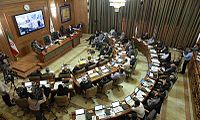Islamic City Council of Tehran
Tehran Islamic City Council | |
|---|---|
 | |
| Type | |
| Type | |
| Leadership | |
Chairman | Mehdi Chamran since September 3, 2014 |
Deputy Chairman | Morteza Talaie since September 3, 2013 |
| Structure | |
| Seats | 31 |
 | |
Political groups | Majority (16)
|
| Elections | |
Last election | June 14, 2013 |
| Meeting place | |
 | |
| City Council Building Behesht Street Tehran | |
| Website | |
| Tehran City Council Website | |
The Islamic City Council of Tehran (Template:Lang-fa) is the elected council that presides over the city of Tehran, elects the Mayor of Tehran, and budgets of the Municipality of Tehran.
The council is composed of fifteen members elected from single-member districts for four-year terms. The Chairman and the Deputy Chairman of the Council are chosen by the council at the first regular meeting in odd-numbered years.
It holds regular meetings on Sunday, Tuesday and Wednesday at 10 am (except on holidays or if decided by special resolution not to meet). The number of members was increased to the 31 persons in the 2013 local elections.
History
Persian Constitutional Revolution passed a law on local governance known as “Ghanoon-e Baladieh”. The second and third articles of the law, on “anjoman-e baladieh”, or the city council, provide a detailed outline on issues such as the role of the councils in the city, the members’ qualifications, the election process, and the requirements to be entitled to vote. Baladieh, or the modern municipality in Iran was established in 1910, to cope with the growing need for the transformation of Tehran’s city structures. [1]
After the First World War, Reza Shah, the founder of the Pahlavi dynasty, immediately suspended the “Ghanoon-e Baladieh” of 1907 and the decentralized and autonomous city councils were replaced by centralist/sectoralist approaches of governance and planning. [2]
Members
Current members
| Name | Affiliation | Notes | |
|---|---|---|---|
| Mehdi Chamran | Principlist (ABII) | Chairman | |
| Morteza Talaie | Principlist (PJPII) | Deputy Chairman | |
| Abolfazl Ghana'ati | Principlist (SF) | 1st Secretary | |
| Mohsen Pirhadi | Principlist (PJPII) | 2nd Secretary | |
| Reza Taghipour | Principlist (SF) | Spokesman | |
| Alireza Dabir | Principlist (PJPII) | Head of Planning–Budget Commission | |
| Rahmatollah Hafezi | Principlist (SF) | Head of Health–Urban Services Commission | |
| Ahmad Donyamali | Reformists | Head of Transportation–Civil Commission | |
| Abolmoghim Nasehi | Principlist (CCA) | Head of Social–Cultural Commission | |
| Parviz Sarvari | Principlist (SPIR) | Head of Supervision–Legal Commission | |
| Mohammad Salari | Reformists (IISP) | Head of Urban Planning–Architecture Commission Deputy Chairman of Reformists Fraction | |
| Abbas Jadidi | Independent | Supervision Deputy of Council | |
| Elaheh Rastgou | Reformists[a] (ex-ILP) | Executive–Bureaucratic Deputy of Council | |
| Ahmad Hakimipour | Reformists (WINP) | Chairman of Reformists Fraction | |
| Mohammad Mehdi Tondgouyan | Reformists | Spokesman of Reformists Fraction | |
| Ahmad Masjed-Jamei | Reformists | ||
| Hossein Rezazadeh | Principlist (SF) | ||
| Habib Kashani | Principlist (ABII) | ||
| Hadi Saei | Independent | ||
| Fatemeh Daneshvar | Reformists | ||
| Abbas Sheibani | Principlist (FFLIL) | ||
| Esmaeil Dousti | Reformists (NTP) | ||
| Mohammad Haghani | Reformists | ||
| Mojtaba Shakeri | Principlist (SDIR) | ||
| Abdolhossein Mokhtabad | Reformists | ||
| Eghbal Shakeri | Principlist (SF) | ||
| Gholamreza Ansari | Reformists (IISP/UIIPP) | ||
| Masoumeh Abad | Principlist (SDIR) | ||
| Mohsen Sorkhou | Reformists (ILP/WH) | ||
| Valiollah Shojapourian | Reformists (UIIPP) | ||
| Ali Saberi | Reformists | ||
Past members
Chairpersons
| № | Term | Chairman | Affiliation | Term of office | Vice Chairman | Affiliation | Term of office | ||||
|---|---|---|---|---|---|---|---|---|---|---|---|
| 1 | 1st | 
|
Abdollah Noori | Combatant Clerics | April 1999 — September 1999 | 
|
Saeed Hajjarian | Participation Front | April 1999 — February 2002 | ||
| 2 | 
|
Abbas Douzdouzani | Participation Front | September 1999 — December 1999 | |||||||
| 3 | 
|
Rahmatollah Khosravi | Forces of Imam's Line | December 1999 — May 2001 | |||||||
| 4 | 
|
Mohammad Atrianfar | Executives of Construction | May 2001 — January 2003 | |||||||

|
Ebrahim Asgharzadeh | Solidarity Party | February 2002 — January 2003 | ||||||||
| 5 | 2nd | 
|
Mehdi Chamran | Alliance of Builders | April 2003 — September 2013 | 
|
Hassan Bayadi | Alliance of Builders | April 2003 — September 2013 | ||
| 3rd | |||||||||||
| 6 | 4th | 
|
Ahmad Masjed-Jamei | Independent Reformist | September 2013 — September 2014 | 
|
Morteza Talaie | Progress and Justice Population | September 2013 — Present | ||
| 7 | 
|
Mehdi Chamran | Alliance of Builders | September 2014 — Present | |||||||
See also
Notes
- ^ a b Elaheh Rastgou entered the council with Reformist support but caucuses with the Principlists.
References
- ^ Vahid Vahdat Zad (2011). "Spatial Discrimination in Tehran's Modern Urban Planning 1906-1979". Journal of Planning History vol. 12 no. 1 49-62. Retrieved 2013-04-11.
- ^ Vahid Vahdat Zad (2011). "Spatial Discrimination in Tehran's Modern Urban Planning 1906-1979". Journal of Planning History vol. 12 no. 1 49-62. Retrieved 2013-04-11.
External links
- Islamic City Council of Tehran, the council's website (in Persian)
